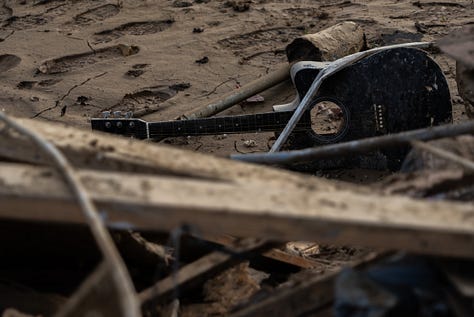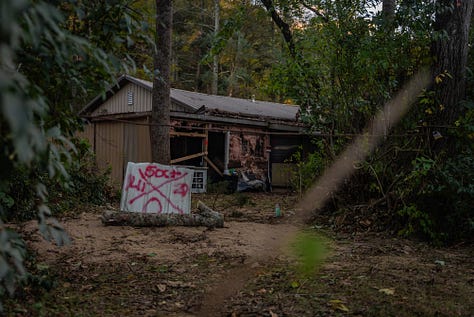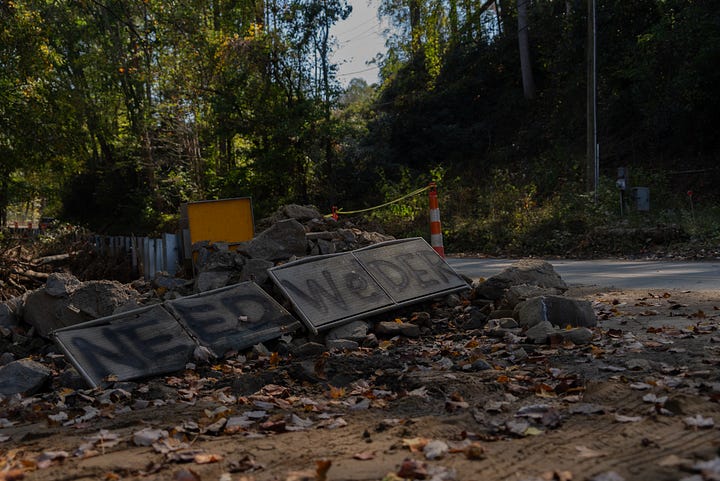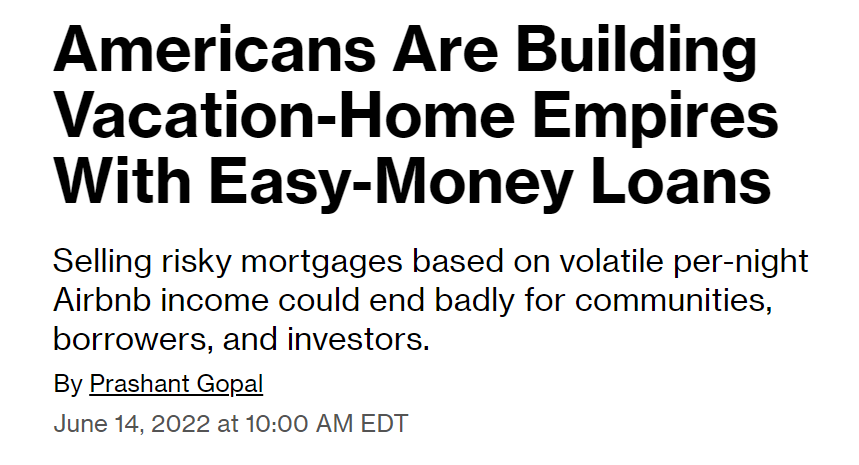Now What?
I sometimes think I’m a coward. The backlash and election furor has made it difficult to write about the only thing I want to write about. It would be one thing if it wasn’t relevant to my readers, but it most certainly is and will have a significant impact on the housing market. What I’ve witnessed first-hand over the last thirty days is a game-changer. I believe it may shape not only the housing market but our politics for many years to come as the suffering in the South right now from Texas to Virginia is enormous.
I’ve written many times here how the South has been ignored for so very long and how what I saw as I traveled the Sun Belt gave off serious Reconstruction vibes. Speculators went wild with no care or concern for the people that lived in the places they infested, looking only to make a dollar. Just as the carpetbaggers packed up and went home, leaving the South incapable of overcoming its structural issues, so will these multifamily, short-term rental and institutional investors who bought (on leverage) every piece of property they could find.
Peter Turchin’s End Times does a really good job of illustrating how the South had to be stomped as they simply had too much power from controlling the raw materials for the factories up North for the elite’s comfort. It’s an age-old story you can find in many countries and regions across the globe between those that produce the materials versus those that refine or manufacture them. History teaches us that the Civil War was about slavery, but underneath that very real issue there were also economic themes that many ignore. If you study working conditions in the North during those times and how the Irish were treated for instance, you can see that as per usual when humans and greed are involved, there aren’t a lot of good guys.
As I wrote about in the piece on the 1927 flood, labor in the form of African Americans fled the South after they became displaced and headed to cities such as Chicago and New York. Without that labor, farming became a completely different ballgame and focus was shifted to innovation. Due to poor weather conditions overseas, demand for U.S. agricultural products increased significantly in the early 70s. In 1972, the Soviet Union signed a contract with the United States for wheats and grains. In 1973, President Nixon’s Secretary of Agriculture called on farmers to “to plant ‘fencerow to fencerow,’ and ‘get big or get out.’ Producers took his words to heart and the race to feed the world was on (my emphasis).”
Land values increased and lenders and farmers erroneously thought that these conditions would persist and become the norm. Sound familiar?
Between 1970-1979
Borrowing became the order of the day and there were plenty of lenders eager to accommodate optimistic farmers.
The Federal Reserve changes their lending policies to hold the line on inflation. The Fed's actions made the cost of borrowing money prohibitive for all Americans. But the effect on farm families and rural bankers was especially severe.
In 1979 the Soviet Union invaded Afghanistan and President Jimmy Carter enacts a grain embargo stopping shipments of grain to the Soviet Union. The embargo wasn’t lifted until 1980 when President Ronald Reagan took office.
Farmers, including my grandfather, took out leverage on those farms so they could plant fencerow to fencerow as instructed and became seriously upside down as land values crashed and inflation raged. My father picked cotton on that farm when he needed work, and it was my grandfather’s and uncle’s bread and butter.
Isolated, the stress of the situation became intolerable for many. Suicides increased and families in rural communities all over the country were destroyed.
From Reagan on May 14, 1982 during a Q&A session with farmers:
I have been meeting in these last few days with leaders from every type of business and industry and of the financial world and the bankers and so forth on this interest question, and one answer keeps coming from every one of them. It is pessimism based on past experience that over the years we've had seven to eight recessions since World War II. And every time the government has gone for the quick fix, artificial stimulant of the money supply, artificial government spending, supposedly, programs that'll stimulate the economy. And the result has been that up goes inflation. It does have a temporary effect on helping unemployment, but it's like trying to treat a fever by eating the thermometer. And the result is about 2 years later we're into another recession. And if you look at the chart back over the years, every recession is getting bigger, worse. And this one is the worst one of all (my emphasis).
When my uncle died in 1982 of a drug overdose, leaving his young wife and two-year old daughter behind, it would start a cascade of events that would lead to the unraveling of our family unit. My grandfather lost his farm, and my mother, sisters and I moved to Memphis while my father went to Atlanta where he could find work for decent pay.
Reagan chose not to bail out the farmers, and our era of hyperfinancialization began in earnest, leaving much of the South in the dust. Fast-forward to COVID and some folks saw the South as a cheap alternative to the places they were living. Others, seeking yield and some guarantee of passive income in the future, boarded buses and headed down to these cities to find investment opportunities. Although places like Florida and Texas saw the largest influx, you can see it all over the South in little towns which I have written about such as Angier, NC; Huntsville, AL and even here in Johnson City, TN.
Unfortunately, yet again, no one was thinking about the structural issues and believed that the COVID travel trends would continue. Prior to Helene, inventory was exploding in Asheville with new highs in my tracking each week. Realtor bros had argued that even in downtimes people would visit these areas. Many used cheap loans to make those purchases. The AirBnb bug infested Appalachia, and that’s how you ended up with 8,464 short-term rentals in Sevierville, TN and 2,800 in Asheville, NC.
Brenna Carles drives along a winding country road in the Great Smoky Mountains, a get-rich real estate podcast playing on the speakers of her brand-new Lincoln SUV. Not long ago, Carles was belting out tunes at Nashville honky-tonks as she struggled to make it as a country singer. Now, at 32, she’s one of the region’s most successful mortgage brokers specializing in loans for vacation home rentals.
Get ready folks. You are about to see wealth destruction the likes of which might make the GFC blush. Inevitably at this point someone will say: no way, everyone will get bailed out!
Really? Ask yourselves why the SBA has no more funds for disaster loans? If I had been a presidential candidate in the current administration and this disaster occurred, I would have moved mountains to show my care and concern for the American people. What better way to curry favor? Hoover’s actions and response to the 1927 flood led him to victory. Why did that not happen? Was there not enough time? Was the division too great? Have we forgotten how to do this? Instead, we got a media blackout and accusations of misinformation. I will repeat that human life is not political, and the suffering and destruction I have seen, most recently in Spruce Pine, NC is beyond comprehension until you see it for yourself.
I have been battling a bit of depression as person after person tried to tell me I have not seen what I have seen. It seemed press outlets such as NPR, which did hit pieces on Americans who were trying to get the truth out there, were more interested in politicking than the American people. There is a difference between the fog of war and misinformation. Struggling to start the day as the darkness that blankets this area in the fall seemed too menacing, I watched a video from a fellow reporter that gave me hope that I was not alone in trying to find the truth and tell this story. I reached out to Andy Fancher, who we interviewed yesterday on DNN. Like me, he is committed to getting the facts and substantiating them. His stories and boots-on-the-ground analysis are very powerful as he luckily gained access early on in the crisis through his connections in disaster relief.
This video he took from Lake Lure, an area which the Weather Channel described as post-apocalyptic, gave me chills as it looked like a movie set for a town decimated by a nuclear bomb.
Luckily, he is much better at taking pictures and videos than I am. The destruction I saw on the way to Spruce Pine was like nothing I have ever witnessed. I wrote on xTwitter that it must have sounded like Armageddon as those trees snapped. One of my followers confirmed it was so, having ridden out the storm there.
Here are a few more of Andy’s pictures from Buncombe County:








Unfortunately, pictures and words do not capture the scale of this disaster, and I believe that many have not contemplated what that loss of revenue to Americans all over the country who invested in these resort towns will do to our economy while layoffs and delinquency were already increasing. Overall delinquency increased from August to September by 3.4%, according to Black Knight data, and this was prior to the impacts we would expect from Helene, which made landfall on September 26th, or Milton. Your late payers typically pay before the 25th day of the month to ensure they don’t get dinged on their credit.
Over the past two weeks, I have been working on an analysis of delinquency in FEMA-designated impact zones ranging from Idalia last year to Milton. Below I will show the current state of delinquency in Texas as it serves as an early warning of what is to come as Beryl made landfall on July 8th. I will also share the delinquency baselines for North Carolina and Florida which currently track at or below the national average. Additionally, I will give summary stats including sales and price data for M3 cities as well as a run-down of new and existing home sales. Excluding September 2010, combined sales (existing + new) came in lower than any other September since 1999. And finally, I will share some powerful testimony from two everyday Americans who are making a huge difference in Appalachia.
Keep reading with a 7-day free trial
Subscribe to M3_Melody Substack to keep reading this post and get 7 days of free access to the full post archives.





